
Scouting, also known as the Scout Movement, is a worldwide youth movement employing the Scout method, a program of informal education with an emphasis on practical outdoor activities, including camping, woodcraft, aquatics, hiking, backpacking, and sports. Another widely recognized movement characteristic is the Scout uniform, by intent hiding all differences of social standing in a country and making for equality, with neckerchief and campaign hat or comparable headwear. Distinctive uniform insignia include the fleur-de-lis and the trefoil, as well as merit badges and other patches.

Gilwell Park is a camp site and activity centre for Scouting and Guiding groups, and is the original home of leadership training in the Scout movement. It is one of the landmarks of the world Scouting movement. The 109 acres (44 ha) site is in Sewardstonebury, Epping Forest, close to Chingford, London.
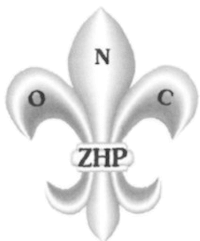
The Polish Scouting and Guiding Association is the coeducational Polish Scouting organization recognized by the World Organization of the Scout Movement and the World Association of Girl Guides and Girl Scouts. It was founded in 1918 and currently is the largest Scouting organization in Poland. The first ZHP was founded in 1916, the current one is the fourth organization with this name. It is a public benefit organization as defined by Polish law.
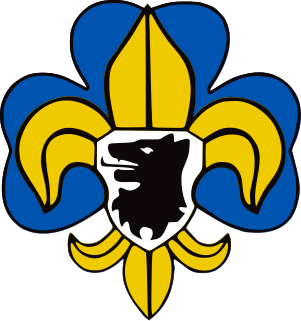
Junák - český skaut, is the internationally recognized organization of Scouts and Guides of the Czech Republic. Founded in 1911, Junák - český skaut is the largest organisation of children and youth in the nation, with a membership of 64,383.
The Scout movement in France consists of about 80 different associations and federations with about 180,000 Scouts and Girl Guides. Next to Germany, France is the country with the most fragmented Scout movement.

Scouting in Quebec has a long history, from the 1900s to the present day, serving thousands of youth in programs that suit the environment in which they live.

The Afghanistan Scout Association was officially founded in 1931 in Afghanistan by a royal decree. The site of Robert Baden-Powell's second posting in 1880, Afghanistan was a member of the World Organization of the Scout Movement from 1932 until the Afghan government dissolved the Scout Association in 1947. Afghan Scouting was formed again from 1964 to 1978 and recognized by the World Organization of the Scout Movement.

Iran Scout Organization was founded in 1925 under the rule of Reza Shah Pahlavi. Currently Iran is one of 29 countries where Scouting exists but where there is no National Scout Organization which is a member of the World Organization of the Scout Movement at the present time.
Air Scouts are a part of the Scout movement with a particular emphasis on an aviation themed programme and/or flying-based activities. Air Scouts follow the same basic programme as other Scouts, but they devote certain amounts of time focused on their air activities.
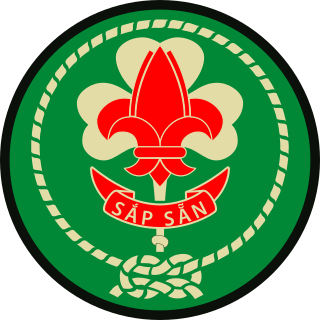
The Vietnamese Scout Association is a youth organization that was established in Vietnam and active between 1930 and 1975. The association was recognized by the World Organization of the Scout Movement from 1957 to 1975.

The Ethiopia Scout Association is the national Scouting association of Ethiopia. The Scout movement was first introduced in Ethiopia around 1919, and had opened a school in Addis Ababa by 1934. However, the association was forced to end its activities due to the Second Italo-Abyssinian War of 1935-1936. Scouting was revived in Ethiopia in 1948, when Scout activities gained a foothold in the schools of Ethiopia. Ethiopia was recognized as a member of the World Organization of the Scout Movement in 1969.
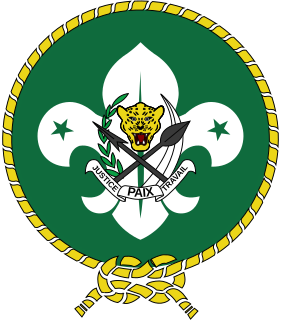
The Fédération des Scouts de la République démocratique du Congo (FESCO), the national federation of eleven Scouting organizations of the Democratic Republic of the Congo, was founded in 1924, and became a member of the World Organization of the Scout Movement (WOSM) first in 1963 and again in 1981. The coeducational Fédération des Scouts de la République démocratique du Congo has 71,486 members as of 2010.
Scouting and Guiding in Italy consists of several associations and federations, including more than 225,000 male Scouts and female Guides.

The Scouting 2007 Centenary comprised celebrations around the world in which Scouts celebrated 100 years of the world Scout movement. The original celebrations were focused on the United Kingdom, such as the camp on Brownsea Island, the birthplace of Scouting, and the 21st World Scout Jamboree in Chelmsford, Essex.
The Conférence Française de Scoutisme is a French Scouting federation, founded in 2000 and serving about 35,000 members of both genders. The CFS is not a member of either the World Organization of the Scout Movement or the World Association of Girl Guides and Girl Scouts.
The Scouting and Guiding movement in Argentina consists of at least ten independent organizations as well as some international units. Scouting was officially founded in Argentina in 1912, shortly after the publication of "Scouting For Boys" in Spanish, was granted a National Charter in 1917, and was among the charter members of the World Organization of the Scout Movement in 1922.
Non-aligned Scouting organizations is a term used by the World Organization of the Scout Movement (WOSM), World Association of Girl Guides and Girl Scouts (WAGGGS) and their member national organizations to refer to Scouting organizations that are not affiliated with them. See List of non-aligned Scouting organizations.
Scouting has sometimes become entangled in social controversies such as in nationalist resistance movements in India. Scouting was introduced to Africa by British officials as an instrument of colonial authority but became a subversive challenge to the legitimacy of British imperialism as Scouting fostered solidarity amongst African Scouts. There are also controversies and challenges within the Scout Movement itself such as current efforts to turn Scouts Canada into a democratic organization.
Youth organizations in the United States are of many different types. The largest is the government run 4-H program, followed by the federally chartered but private Scouting movement groups: the Boy Scouts of America (BSA) and the Girl Scouts of the USA (GSUSA). Another somewhat smaller but co-ed Scouting derived group is Camp Fire. Other youth groups are religious youth ministries such as the evangelical Christian Awana, Seventh-day Adventist Pathfinders, and Assemblies of God Royal Rangers.
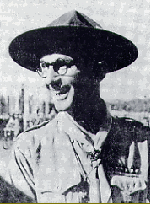
Pierre Delsuc served as the General Commissioner of zone Nord from 1941 to 1944, International Commissioner of the Scouts et Guides de France from 1944 to 1946, as well as a member of the International Scout Committee from 1951.












